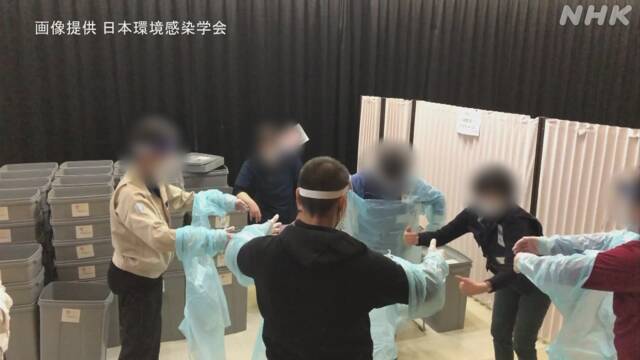The Japanese Society for Infection Control and Prevention has started a project to dispatch experts to facilities for the elderly where a cluster of new coronaviruses has occurred to provide advice and guidance for infection prevention.
The academic society wants to prevent similar infections from occurring again by taking measures according to the site.
With the current spread of infection, which is considered to be the "third wave" of infection, infections are occurring one after another in facilities for the elderly, where many people are at high risk of becoming severe.
The Japanese Society for Infection Prevention and Prevention, which is made up of doctors and nurses specializing in infection prevention, has been commissioned by the government since the end of last month to promote infection control at these facilities. We have started dispatching specialists to welfare facilities.
At the request of the national and local governments, the academic society dispatches experts from all over the country, who advise the staff of the facility on measures to prevent infection and give guidance.
Earlier this month, at facilities for the elderly in Asahikawa City, Hokkaido, where clusters occurred, there was a method to safely remove protective clothing such as gowns, and a "zoning" method to separate areas with a high risk of infection from areas that are relatively safe. It means that he advised about.
Professor Masaki Yoshida of the Jikei University School of Medicine, who is the chairman of the society, said, "I think that many facility staff are unfamiliar with infection control such as wearing protective clothing. Experts should give direct advice locally. So, we can take measures that suit the site. We want to prevent clusters from occurring again. "
The experts dispatched to the site
Professor Elisa Sugawara of Tokyo Health Care University Graduate School, who specializes in infection prevention measures, was dispatched to Asahikawa City, Hokkaido earlier this month to give advice and guidance on measures at welfare facilities for persons with disabilities where clusters occurred.
At the facility, rules for infection prevention, from where to put on and take off protective clothing to how to dispose of garbage, have begun to be put in place, so Professor Sugawara said that for staff who have to work with protective equipment on. It means that it was an environmental improvement, such as creating a space where you can take a break without going outside.
He also instructed nurses dispatched from medical institutions for support, such as how to safely remove protective clothing and procedures.
Regarding the situation of the facility, Professor Sugawara said, "At the facility, there are not always people who are familiar with infectious disease control, and I think the staff at the facility were quite anxious. Some people became close contacts due to the infection. Due to the withdrawal, the shortage of human resources was very severe and seemed to be quite tired. "
On top of that, "Since there is a possibility that the facility will continue to be supported from outside Hokkaido, it is necessary for newcomers to understand the rules for infection prevention, such as putting on and taking off protective clothing. Of course, business support is important, but I also felt that it was necessary to create a mechanism that would allow the measures to be communicated internally. "

